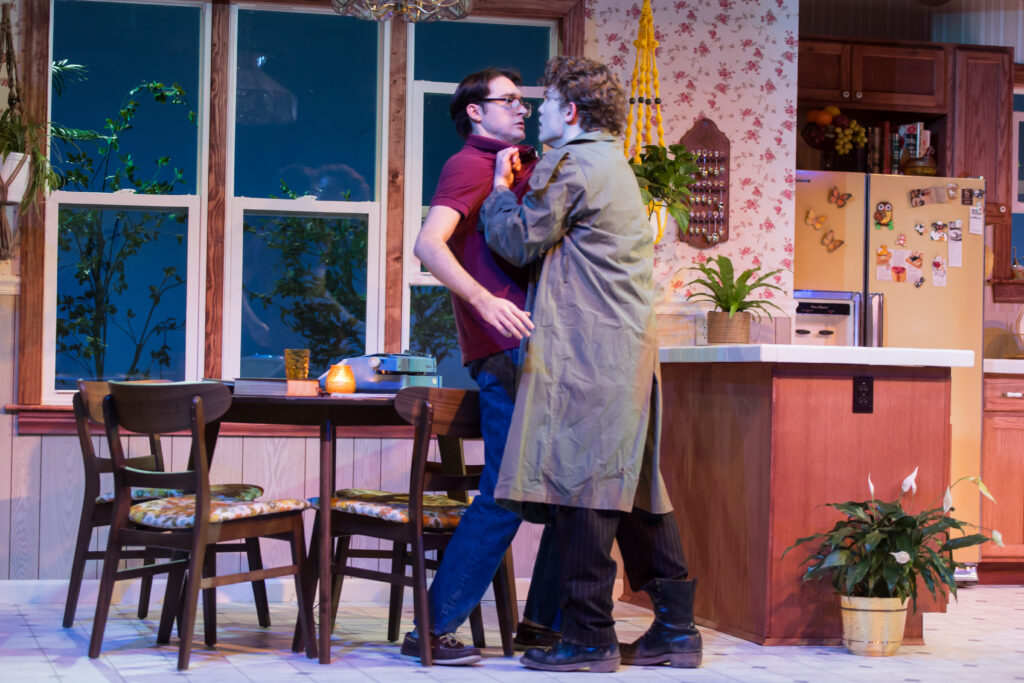A tale of transformation: UMW Theatre’s “True West” reins in audience as bridling brothers find common ground
5 min read
From left to right: Austin, played by Mason Clark, and Lee, played by Seth Drenning, get into a physical altercation early on in the show. Photo courtesy of Geoff Greene.
by ERIKA LAMBERT
Staff Writer
Sam Shephard’s “True West,” delves into the complex dynamic between Austin, a dignified individual who writes screenplays played by senior theatre and physics major Mason Clark, and Lee—senior theatre major Seth Drenning—a rugged alcoholic thief who lives in the desert. But greater than their sense of individual identity is their brotherly connection, which fuels the havoc-ridden plot of the show.
The estranged brothers are reunited when their mother—played by senior theatre and English double-major Maddie Baylor—takes a trip to Alaska and tasks Austin with the responsibility of caring for her home while she is away. In the meantime, Lee is temporarily residing in the house, planning to steal from the other houses in the neighborhood.
As “True West” unfolds, Austin seeks the approval of Hollywood producer Saul Kimmer— senior theatre major Nathaniel Huff—and faces significant challenges in writing a true Western screenplay. In a surprising twist, Lee presents his own screenplay idea to Kimmer who accepts it over Austin’s, initiating a compelling exploration of ambition, rivalry and the unpredictable nature of success in Hollywood.
In a hilarious and unexpected turn of events, the brothers in “True West” gradually begin to transform into each other. As Austin finds himself going through a drunken haze, Lee takes on the unlikely role of a screenwriter, attempting to put his movie idea into words. But Lee’s lack of education and dependence on Austin’s skills in typing lead to the brothers striking a deal: Austin agrees to assist Lee in crafting his screenplay, and in return, Lee promises to fulfill Austin’s new fantasy by taking him to the desert.
As the collaborative efforts between the two unfold, the house is left in chaos. Their mother returns earlier than expected from her Alaskan expedition, and both brothers scramble to apologize for the havoc wreaked in her absence.
For the actors, preparing for their characters is a vital aspect of the rehearsal process. For Clark, this meant finding the source of his character’s emotional shifts. To portray his character well, he “needed to deeply invest in Austin’s hopes,” said Clark.
He continued, “Austin doesn’t change personalities, he just reveals a different side to himself that he didn’t want to acknowledge before.”
Gregg Stull, chair of the UMW Department of Theatre and Dance and producing director of UMW Theatre, said that casting challenging roles requires “experienced actors whose process can lead them to a deep connection with the characters and the willingness to be vulnerable to an audience while realizing the demands of the roles.”
About the lead roles in “True West,” Stull attributed the actors’ closeness and ability to be vulnerable with each other on stage to their frequent collaboration over the past four years.
“I was fortunate that these four actors have worked together frequently over the past four years and shared a connection that helped them trust each other from the very first rehearsal,” said Stull.
He continued, “My work as a director is to create an environment where the actors have the stimuli they need to bring the play to life. I also have to create a culture in which they feel brave and can explore the intensity of the characters’ emotional lives.”
The themes of family and brotherhood resonate throughout the show, and despite the tension between the brothers, they recognize a shared identity. While seemingly in competition, the brothers subtly admire each other’s lives, which leads to their personal growth and helps them connect over a shared frustration over their alcoholic father. Both brothers harbor anger and fear of becoming like their father but cannot fully abandon him. Seeking help from their mother, they discover she is as lost as they are.
“It’s all love,” said Clark about the show’s underlying message. “It’s tough to see from outside, but if they didn’t love each other, there would be no reason to stay. I think with all families, no matter how frustrating it gets, you always forgive each other and keep loving each other.”
The technical side of the production that occurs behind the scenes is not readily visible to the audience, but it holds significant importance in the play—especially with interspersed classic country hits that play during scene transitions and contribute to the lively atmosphere.
“There are two scenes in the second act that have major changes to the set. We rehearsed both of the transitions many times, and we even changed the tracks that we had several times over,” said Maddie Chin, the first assistant stage manager and a sophomore theatre major. “It was a lot of collaboration and effort from every single person on the stage management team as well as the run crew.”
Martha Stitt, the sound engineer for the show and a junior theatre major, rehearsed with the production team to curate the technical aspects of the show and collaborated with the light board operator to make sure they hit their cues at the right time.
“During tech rehearsals, we had the opportunity to discuss how the sound felt in the scene with the other designers, production members and the director,” she said. “Since the sound cues tend to align with the light cues throughout the show, I am working together with the light board operator to listen to the stage manager and ensure everything runs smoothly.”
The collaboration between the actors, director and production team fostered a passionate environment to work in, according to Baylor.
“It is always lovely to work alongside people who take their work so seriously and approach the process with the same level of passion,” she said. “I am eternally grateful for their dedication and the support that they give us every day; they are always the first ones to arrive and the last to leave.”
In addition to the friendships made during the rehearsal process, the impact of the performances extends beyond the theatre, providing the cast with valuable insights about both themselves and the world.
“Every time I perform, I learn so much about acting and the world we inhabit, and through this experience, I’ve learned a lot about family and what it means to be an adult and reckon with the skeletons in your family’s closet,” said Huff.
But it’s not just the actors who can leave the stage with these impressions; the audience is meant to as well.
“I want our audience to think about the play long after they leave–to consider how our hopes and dreams can also lead to profound disappointment,” said Stull. “I hope, as well, that our audience considers that people are complex and we never really know the inner lives of those around us.”
Without a doubt, the effect has been achieved. As I exited the theatre and made my way home, the play lingered in my thoughts, causing me to yearn for the characters and relive the emotions that filled the theatre during the performance.
“True West” runs from Feb. 15–25 with showings at 7:30 p.m. from Thursday to Saturday and a matinee show at 2 p.m. on Sunday.










